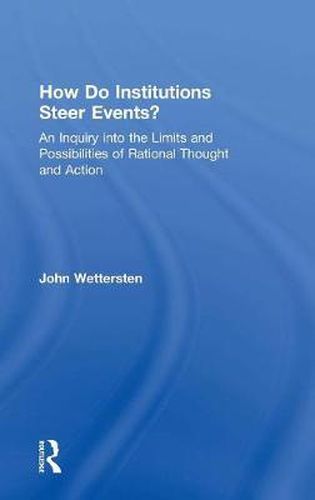Readings Newsletter
Become a Readings Member to make your shopping experience even easier.
Sign in or sign up for free!
You’re not far away from qualifying for FREE standard shipping within Australia
You’ve qualified for FREE standard shipping within Australia
The cart is loading…






Theories of explanation in the social sciences vacillate between holism and individualism. Wettersten contends that this has been a consequence of theories of rationality which assume that rationality requires coherent theories to be shown to be true. Rejecting these traditional assumptions about rationality Wettersten claims that the traditional explanations of rationality have placed unrealistic demands on both individuals and institutions. Analysing the theories of Weber and Popper, Wettersten shows that Popper made considerable progress in the theory of rationality, but ultimately stayed too close to the ideas of Hayek, he explains how this dilemma leads to difficulties in economics, anthropology, sociology, ethics and political theory, and constructs an alternative theory that rationality is critical problem-solving in institutional contexts.
Wettersten contends that ‘the critical consideration of theories followed by their improvement’ dispenses with the need for justification and sees rationality as a social phenomena with an institutional basis. The main social advantages this view offers is that the degree of rationality individuals achieve may be increased by institutional reform without moralizing and that we can explain how institutions steer events insofar as we understand how they determine the problems which individuals seek to solve. It is argued that the central moral advantage of this view is that rationality is shown to be Spinozistic in the sense that it is natural and furthers morality and peace of mind.
$9.00 standard shipping within Australia
FREE standard shipping within Australia for orders over $100.00
Express & International shipping calculated at checkout
Stock availability can be subject to change without notice. We recommend calling the shop or contacting our online team to check availability of low stock items. Please see our Shopping Online page for more details.
Theories of explanation in the social sciences vacillate between holism and individualism. Wettersten contends that this has been a consequence of theories of rationality which assume that rationality requires coherent theories to be shown to be true. Rejecting these traditional assumptions about rationality Wettersten claims that the traditional explanations of rationality have placed unrealistic demands on both individuals and institutions. Analysing the theories of Weber and Popper, Wettersten shows that Popper made considerable progress in the theory of rationality, but ultimately stayed too close to the ideas of Hayek, he explains how this dilemma leads to difficulties in economics, anthropology, sociology, ethics and political theory, and constructs an alternative theory that rationality is critical problem-solving in institutional contexts.
Wettersten contends that ‘the critical consideration of theories followed by their improvement’ dispenses with the need for justification and sees rationality as a social phenomena with an institutional basis. The main social advantages this view offers is that the degree of rationality individuals achieve may be increased by institutional reform without moralizing and that we can explain how institutions steer events insofar as we understand how they determine the problems which individuals seek to solve. It is argued that the central moral advantage of this view is that rationality is shown to be Spinozistic in the sense that it is natural and furthers morality and peace of mind.